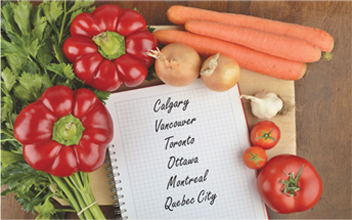It is also important to remember that Quebec is a bilingual province. Both Bricker and Borsellino commented on the need to speak French. “If you don’t learn French, it’s going to be quite difficult,” Borsellino confirms. “The majority or 50 percent of your clients will speak French.” Bricker puts it this way: “If you don’t speak French, good luck.”
A Few Final Thoughts
As you look across this vast country, the most important takeaway is that contrary to stereotypes, Canada is anything but simple and homogenous. Culture, landscape, traditions, politics, and even language can be province- and city-dependent.
And, as Webber points out, “Canada is not the fifty-first state.” While Canada and the United States share a border and certainly have many similarities, there are fundamental differences such as Canada’s constitution, political system, currency, and labor laws to name a few. There are also produce-specific business practices and customs Americans should be familiar with and respect.
Both Webber and Bricker agree that Canada’s political system is vastly different from the United States. With three to five major political parties—depending upon who you ask—Canada elects its officials to Parliament in elections that last roughly 34 days instead of the months or even years seen in America.
“A lot of people don’t know the Prime Minister is not elected by all Canadians,” Webber explains. “If conservatives have the most seats (in Parliament), the conservatives run the government and the Prime Minister is the head of that party. So when the balance of power changes, so does the Prime Minister.” Further, he adds, “provinces retain much more power than states in the United States.” Webber also cites a major difference in conducting business: “In the United States, the moment a business transaction moves across state lines, you have federal jurisdiction. Here, matters of contract law are left to the provinces.”
The list can go on and on, but bottom line: Canada is Canada—and recognizing the uniqueness of this nation, as well as its provinces and cities, can mean the difference between success and failure for those hoping to capitalize on the True North’s lucrative and produce-friendly marketplace.
Image: Shutterstsock



